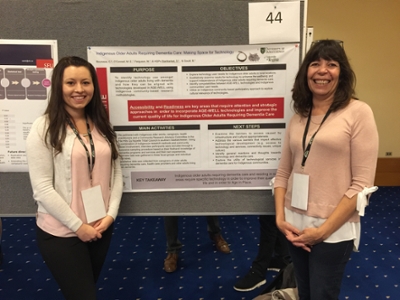
Advancing Indigenous governance: Danette Starblanket
On the road to Indigenous nation-building
By Charvee Sharma, Communications Specialist
For Indigenous scholar Dr. Danette Starblanket (PhD), research is the culmination of years of lived experiences of working within Indigenous governments and communities, translating insights into practice. She is currently an assistant professor at the Johnson-Shoyama Graduate School of Public Policy (JSGS), University of Regina campus.
Before entering academia, Starblanket spent nearly two decades working with First Nations governments and institutions which gave her tremendous experience into the areas of Indigenous governance and public policy. An urban member of the Star Blanket Cree Nation in Treaty 4, her interest in exploring Indigenous priority areas deepened during her undergraduate degrees.
“There was a significant gap between academic literature and the realities voiced by the community about Treaty rights,” she said.
Her own experiences as a First Nations civil servant gave her the opportunity to closely engage with policy development, implementation, and review; but what she found missing was the connection between mainstream policy development and its impact on Indigenous communities.
In her past work, Starblanket has collaborated with the File Hills Qu’Appelle Tribal Council’s Community Research Advisory Committee (CRAC) to explore the relationship between technology and dementia in Indigenous populations.
Using a suite of qualitative research methods, in her PhD work at the University of Saskatchewan (USask), she analyzed Indigenous protests and the consequent government response during the ‘Idle No More’ movement, which stirred the socio-political climate across Canada.
More than 10 years since the female-led movement first sparked awareness on Indigenous rights, Starblanket sees the ongoing movement as a catalyst for igniting change through the collective voices in Indigenous communities, especially for women and youth.
Starblanket’s cross-disciplinary approach and community collaborations echo in her classrooms just as much in her research and are brought to life by master storytelling.
In some of the coursework, Starblanket challenges students to assume a policy advisor’s role to an Indigenous organization; in others, she is asking them to prepare a briefing note for the Chiefs.
“It is the practical real-world awareness that helps students broaden their perspectives,” she said.
At JSGS, Starblanket teaches Indigenous Governance, part of the Indigenous Nation-Building Graduate Certificate, a course created and delivered through a unique partnership between JSGS and the First Nations University of Canada (FNUniv). She also works with an Indigenous team at JSGS to align the JSGS objectives with the Indigenous Engagement offices at the University of Regina and USask to build new supports for Indigenous researchers, students, faculty, and staff.
“It is vital that students look at diverse perspectives to deepen their understanding of how Indigenous government systems work – that there are resolutions, legislative assemblies, policy documents and briefing notes involved,” she added.
Engaging community in policy research is an imperative for Starblanket, who wishes to do more work in Indigenous policy development.
“There is a lot of expertise in Indigenous community that we haven’t yet fully tapped into, and a lot can happen by bringing more Indigenous students and community collaborations into these research areas.”
Being at the heart of community-engaged research, Starblanket acknowledges the need for more funding to do the work that Indigenous community needs and requires to be done. “Policy interventions can, in some cases, save lives," she said.
An example is the most recent results from the Canadian Community Health Survey, from 2017 to 2018, which indicate Indigenous Peoples are particularly at risk of facing food insecurity in the North, with rates of household food insecurity reaching 21.6 per cent in the Northwest Territories.
“The lack of sustainable and authentic partnerships to undertake meaningful, long-term projects is a challenge,” Starblanket explained. “Without greater attention and focus by governments and policy makers, quality of life in the North will continue to face a dire situation.”
On the road to advancing reconciliation, Starblanket envisions a Canada where Indigenous policy is integrated and normalized in all societal spheres. She advocates for the development of an Indigenous civil service to make Indigenous self-governance a reality for generations to come.

